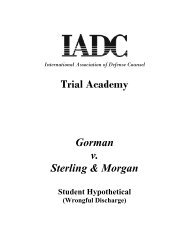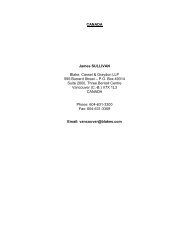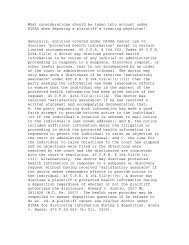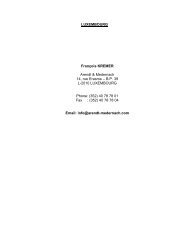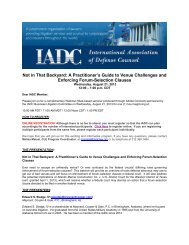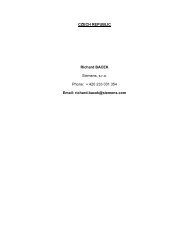Defense Counsel Journal - International Association of Defense ...
Defense Counsel Journal - International Association of Defense ...
Defense Counsel Journal - International Association of Defense ...
You also want an ePaper? Increase the reach of your titles
YUMPU automatically turns print PDFs into web optimized ePapers that Google loves.
Page 462 DEFENSE COUNSEL JOURNAL–October 2012damage multipliers, although onlytangentially. In Loudermilk Services, Inc.v. Marathon Petroleum Company LLC, 59the Southern District <strong>of</strong> West Virginiareviewed the proposed trial plans <strong>of</strong> acomprehensive claim with 654 plaintiffs.In discussing the use <strong>of</strong> a punitivedamage multiplier, the court stated thefollowing:Using the multiplier, a jury couldmake a determination <strong>of</strong>reprehensibility on a class-widebasis and decide on a numberwhich reflects this degree <strong>of</strong>reprehensibility. That numberwould then be applied later toindividual plaintiffs, once anindividual class member’s claimis adjudicated and he is found tohave suffered harm from theconduct upon which themultiplier is based. 60The court held that because themultiplier was a direct ratio betweenpunitive and compensatory damages, it“ensure[d] a consistent and logic[al]relationship between punitive damagesand actual harm.” 61 While the courtaccepted and embraced the punitivedamage multiplier, it did prohibit its useto punish a defendant directly on harmsthat it allegedly inflicted on nonparties. 6259 No: 3-04-0966, 2008 U.S. Dist. LEXIS67866 (S.D.W.Va. Sept. 5, 2008).60 Id. at *13.61 Id. at *14.62 Id. at *14 (citing Philip Morris, 549 U.S.346 (2007)).C. MarylandMaryland’s high court considered theviability <strong>of</strong> using a punitive damagemultiplier in class action litigation thatinvolved claims against several tobaccomanufacturers in Phillip Morris, Inc. v.Angeletti. 63 Defendants successfullypetitioned the Maryland Court <strong>of</strong> Appealsto vacate the circuit court’s certification<strong>of</strong> two classes, asserting that the circuitcourt grossly abused its discretion incertifying classes that did not meet therequirements for a class action suit. 64 Thedefendants also argued that the circuitcourt violated their state and federalconstitutional rights by splittinginterrelated issues <strong>of</strong> liability andcausation, and impermissibly separatingpunitive damages from liabilitydeterminations. 65 Class actionrepresentatives rebutted with threearguments: (1) bifurcation <strong>of</strong> commonliability from damages or causation wasnot constitutionally infirm; (2) the circuitcourt properly concluded that a punitivedamage multiplier could be determined asa common issue separate from findings <strong>of</strong>liability and actual damages; and (3) thecircuit court was correct in determiningthat a claim for medical monitoring wasappropriate for class certification. 66The court <strong>of</strong> appeals provided asummary <strong>of</strong> its previous opinionshighlighting Maryland’s “essentialfeatures underlying an award <strong>of</strong> punitivedamages.” 67 The court <strong>of</strong> appeals began63 Philip Morris Inc., v. Angeletti, 752 A.2d200 (Md. 2000).64 Id. at 208.65 Id.66 Id. at 209.67 Id. at 246.



